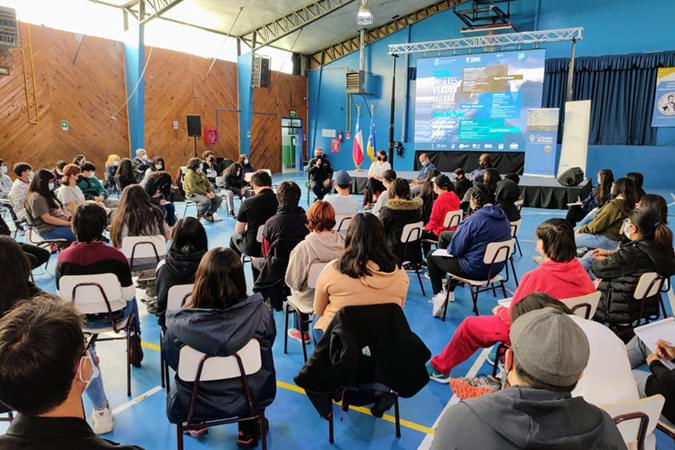Students and scientists reflect on the challenge of relearning how to relate to the environment
January 13, 2022
Not having water to water the house plants, to take care of animals, or to drink. This is how dramatic the situation has become in recent years in different parts of Chile and the world, while the effects of climate change advance. A reality that is not new for the student Francisca Acosta, from the town of Chincolco, in the commune of Petorca.
“When I came on the plane I was very surprised because I saw water. You have water, on the other hand, we have to find ourselves to drink and to be able to have our animals. The sector where we find ourselves was previously surrounded by animals and now the farmers have been forced to eliminate them”, tells the high school student from a sector of the Valparaíso region that has spent more than ten years in drought, facing water scarcity.
The testimony was given in the workshop “How to face the effects of climate change in the Magallanes region?” held on Tuesday, January 11 in Puerto Natales, within the framework of the Global Youth Climate Pact project, led by the academic from the Faculty of Education of the Pontificia Universidad Católica de Chile, Luis Flores.
The green workshops were held between January 11 and 13 in the city in southern Chile, and nearly 80 high school students from different parts of the country and national and international academics and researchers participated in them.
Relearn to relate to the earth
The reality of Petorca was repeated among the different participants in the event. Another example of this is the story shared by Sofía, also a student from Chincolco, who pointed out that "everything is very dry there, it hardly rains." “About a week ago they cut off the water from two in the afternoon until seven, then they left it on until nine or ten at night and they only turned it on again in the morning. So, the periods in which they provide water are very short because there simply isn't any left,” he added.
Facing this scenario, "The climate urgency requires profound economic, cultural, and educational transformations, because it poses challenges, especially for the adult world, to unlearn and relearn the relationship with the ecosystem that led us to this point," explained in the opening ceremony the dean of the Faculty of Education UC, Alexander Carrasco. For this reason, he said, the spaces for discussion between the academy and young people “are great initiatives that we support from the Catholic University. The pedagogical model of these dialogues is interesting, where young people are protagonists and converse with science. They are the hope and we believe that intergenerational dialogue is the answer”.

For the researchers and young people present in the activity, the need to transform the way in which human beings relate to the environment and with beings of other species. “It is important to take care of this common home: planet Earth. The Catholic University is committed through the centers and institutes and academics who research on this subject. That is why we have turned towards the sustainable, we investigate it, we educate and we live”, said the rector Ignacio Sanchez.
The project Global Youth Climate Pact It began in 2015, within the framework of COP21 in Paris, and has led the scientific and intergenerational conversation on the challenges of climate change in different parts of the country. Workshops have already been held in places like Easter Island and Chiloé.
The project leader and UC academic, Luis Flores, He pointed out that “to date, more than 30 countries participate with the presence of more than 2.000 young high school students represented on the five continents. And the Green Workshops in the city of Puerto Natales are an unprecedented experience, not only because of the number of people gathered, but, above all, because of the joint and field experience of students, academics, and researchers from different universities. and research centers in the country.
The activity was carried out over three days and had the support of the municipal and government authorities of the Magallanes region. One of them was the mayoress of Puerto Natales, Antonieta Oyarzo, who highlighted the importance of opening instances of conversation with high school students, since “It has been the young people who have raised the alert in our country and the world. Thanks to them we have understood that living better not only has to do with material conditions, with a new way of living and a new way of thinking and doing”.
Various authorities and experts also participated in the inauguration, such as the senator and president of the Commission for the Future, Guido Girardi the senator and president of the Environment Commission, Ximena Orders; the national director of the Chilean Antarctic Institute, Marcelo Leppe; the Regional Governor of Magallanes, Jorge Flies Añón; and the director of the UC Center for Global Change, Sebastian Vicuna.
Relive the first day of the Green Workshops here:
